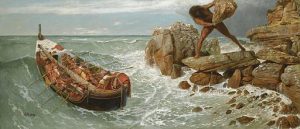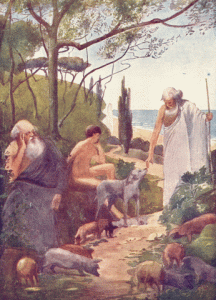April is National Poetry Month. Celebrate by exploring Homer’s epic poem, the Odyssey. The epic is a sequel to Homer’s Iliad, the story of the Trojan War. The Odyssey follows Odysseus, one of the Greek leaders, on his journey back to his kingdom in Ithaca after the fall of Troy. Both poems are believed to have been composed in the late eighth or early seventh century B.C., and are among the oldest stories we have.
Odysseus’s journey home will ultimately take ten years, and involve many adventures. They include engaging in battle with Polyphemus, the Cyclops (one-eyed giant); being held prisoner on an island by the nymph Calypso; and losing his ship in a storm sent by the angry sea god, Poseidon. When he finally arrives home he finds that his troubles are not over. Due to Odysseus's long absence, it is assumed he has died and a group of rowdy suitors have taken over his palace and are competing for his wife Penelope’s hand in marriage.
There have been many translations of the Odyssey. Robert Fitzgerald’s classic translation, and Robert Fagles contemporary take, are two of the most prominent. Last year saw a well-received new translation by Emily Wilson, the first translation of the epic into English by a woman. Wilson, is a professor of classical studies at the University of Pennsylvania.
There have also been a number of notable reworkings and dramatizations of the poem. James Joyce’s Ulysses, tells the story of Leopold Bloom's travels around Dublin on June 16, 1904. This story is intended to parallel Homer's Odyssey. The Penelopiad by Margaret Atwood revisits the story from the point of view of Penelope, Odysseus’s wife. The Odyssey, starring veteran American actor Armand Assante, is an award-winning TV miniseries based on the epic.
The poem is a cornerstone of Western literature. In 2018, when BBC Culture polled experts around the world to find out what stories they felt had “shaped mindsets or influenced history,” Odyssey topped the list.
If you would like to learn more about the poem, and the world that produced it, or read the epic in one of its popular translations, click on the list below to access a variety of Boston Public Library Resources.
Homer's epic poem, the "Odyssey," is a cornerstone of Western literature. Use the resources on this list to explore the poem, the society that produced it, and the impact of the epic on Western literature.




Add a comment to: Explore a Classic Epic Poem: Homer’s Odyssey